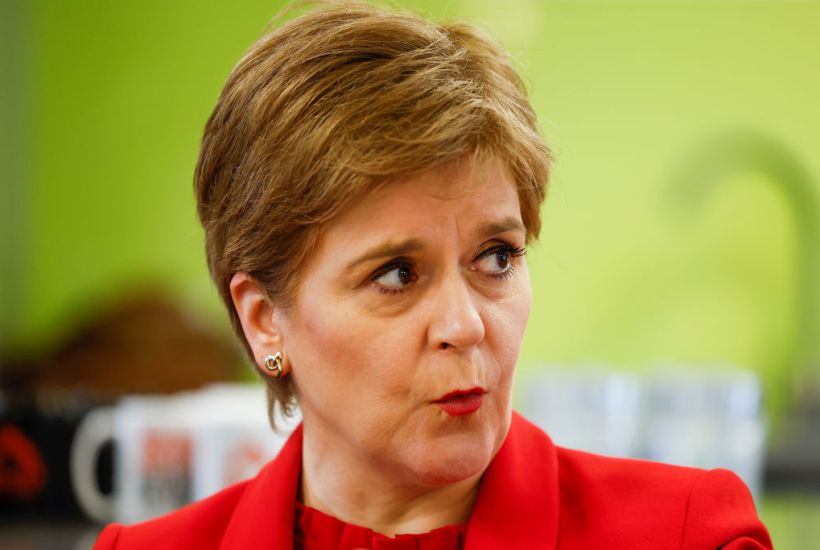As the pound fell to a record low on Monday on the back of Kwasi Kwarteng’s ‘mini-budget’, the pings on SNP MPs and MSPs private WhatsApp groups must have ballooned in line with Gilt yields. There were many aspects to consider: the challenge of responding to the 45 per cent rate of income tax being scrapped and cuts to stamp duty, and how this new tax competition will impact Scotland’s budget; the impact on cost-of-living challenges; international concerns that the volatility induced in financial markets could destabilise the global economy. All too predictably, the messaging from senior SNPers focused on this being yet another reason for Scotland to exit the UK.
On Monday, SNP Commons leader Ian Blackford tweeted:
‘All of the economic arguments of the better together campaign in 2014 for Scotland staying in the UK have been dismantled and now blown apart by this UK Govt. Brexit has been a disaster now they have destroyed any financial credibility they had. #YouYesYet’
As well as citing Brexit as a reason for Scotland to go it alone, Nicola Sturgeon in recent years has also insisted the Covid emergency boosts the case for separation. At one point, she even tried to link the war in Ukraine with the argument for secession from the UK. Is there any international crisis or trend that does not justify breaking apart one of the world’s most established democracies? Apparently not.
Blackford is, of course, wrong. As misguided as the policies announced in Friday’s budget are, the fact of these policies having a negative impact on Britain’s economy does not justify the SNP’s own misguided policy of cutting Scotland out of the UK economy. In 2014, Sturgeon and Blackford argued the case for a new state with no currency of its own and no central bank able to control Scotland-specific interest rates or engage in quantitative easing.
We can now look back on this period as an era in which advanced economies relied on their central banks and their deep and established sovereign debt markets to self-finance a series of economic bailouts. The SNP fought tooth and nail to cut Scotland off from that type of support when it was needed most. If they had had their way, it would have clearly been a disaster.
The SNP’s strategy now is to present itself as a reasonable alternative to an economically thoughtless UK. But the policy of cutting Scotland off from the UK’s monetary and fiscal structures makes no more sense today than it did before the advent of Trussonomics.
Scotland’s fiscal deficit is projected to be within touching distance of 10 per cent of GDP in the mid-2020s. Crystallising a deficit of that size as a Scotland-only liability for a new state with no sovereign debt borrowing record would be reckless. Combine that with a currency policy that would keep Scotland tied to sterling informally (‘sterlingisation’) when an independent Scotland would also start off with a large trade deficit, and we’re talking almost guaranteed economic hara-kiri.
If Trussonomics is stupid, then Sturgeonomics is crazy.
The market reaction to the UK budget might also reinforce a new realisation people are getting of how vulnerable open economies are, and in fact have always been. This follows a period in which many came to view low interest rates, low inflation and rising house and other asset prices as the norm. Central banks and other arms of government face a constant battle to neutralise external and other shocks. No matter how misguided the current UK government is, knowing we have at our backs one of the world’s most credible central banks in charge of one of the world’s few reserve currencies is still comforting.
The people of Scotland will probably have a sense of this, even if most are unaware of the detail. They will also recognise the ephemeral nature of the self-induced economic difficulties of the Truss government. Politics will ultimately take care of her administration in a relatively short period of time, whether that’s through a reversal of aspects of the budget to placate markets in coming weeks or months, or a new government after a general election in 2024.
It is unlikely there would be any way back from the economic shock that would come with independence. The consequences would have to be played out in full. Economic recovery would be measured in years, maybe even decades.
Recent days have provided an abject lesson in how markets react to a government that plays fast and loose with fiscal credibility. Nicola Sturgeon and her party might see it as another opportunity to make the case for independence, but in reality it is another reminder of how dangerous her blind faith in separation is.
Got something to add? Join the discussion and comment below.
Get 10 issues for just $10
Subscribe to The Spectator Australia today for the next 10 magazine issues, plus full online access, for just $10.



















Comments
Don't miss out
Join the conversation with other Spectator Australia readers. Subscribe to leave a comment.
SUBSCRIBEAlready a subscriber? Log in